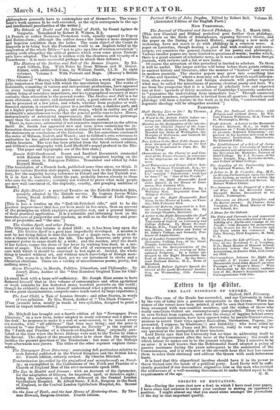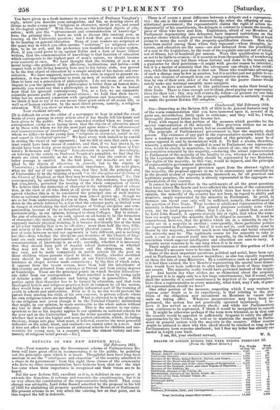OBJECTS OF EDUCATION.
Six—During the years (not now a few) in which I have read your paper, I have often had occasion to notice your candour in stating an opponent's position. I might almost say that you stand alone amongst the journalists of the day in that important quality. You have given us a fresh instance in your review of Professor Vaughan's reply, where you describe your antagonists, and his, as desiring above all things to make young men "religious in character, moral in act, and sound in theological opinion." With them these are the principal objects of edu- cation; with you the "advancement and communication of knowledge" form the primary. idea. I have no wish to discuss this contrast now, as bearing on the University question ; but I wish that you would discuss it in its bearing on general education. Many of your readers are surprised at the quiet way in which you often assume "sectarian," i.e. religious educa- tion, to be an evil, and the preference you manifest for a secular system. Now, if you could prove to us, against Butler and a host of lesser ethical writers, that the communication of knowledge is that function of education which corresponds to the highest part of man's nature, we should become your converts at once. We have thought that the training of man as a moral being—the guidance of his affections, inclinations, and habits—with respect both to his living honestly here and to his future state, was proved to be the first object of education by a simple analysis of his nature SIBI con- stitution. We have supposed, moreover, that, even in regard to present ex- pediency, it was more important to train up men of rectitude and sobriety than to turn out a generation of philosophers. I do not mean, of course, to impute to you the opinion that a philosopher is better than an honest man ; probably you would say that a philosopher is more likely to be an honest man than his ignorant contemporary. Yet, as a fact, we see eminently scientific persons guilty of great moral crimes ; we bold that their know- ledge has no necessary connexion with uprightness and benevolence ; and we think it best to try if we can secure these great ends of all social life, as well as of human existence, by the most direct process, namely, a religious education. Will you show us where we are wrong. Your obedient servant, M. [It is difficult for even the editor of a newspaper to bear in mind the exact words of every passage in every article after it has finally left his hands and been given to the public. We were somewhat startled when we found our correspondent citing us as laying down that the objects of education aimed at by those with whom we for the most part agree were—"the advancement and communication of knowledge," and the objects aimed at by those with whom we differ—to make young men "religious in character, moral in act, and sound in theological opinion." We have every wish indeed to be candid in stating the views of our opponents; but we felt at once that such a con- trast would have been excess of candour, and that, if we had drawn it, we should have been doing gross injustice to our own views, and those of Uni- versity Reformers and "Secular" Educationists in general. Accordingly, on turning to the article on Professor Vaughan's pamphlet, we find that the words are cited correctly as far as they go, but that the context of the latter passage is omitted. In the first place, our remarks are not ap- plied to the objects of education in general, but to the objects of Universities; a distinction of considerable importance. In the next place, what we did say of our opponents was, that they held the principal aim of Universities to be the training of .youth "in the discipline and doctrine of the Church of England, so that they may be religious in character," &c. Our correspondent, by omitting the former clause of this sentence, has quietly, but completely, perverted the bearing of the whole comparison of views. We believe that the formation of character is the ultimate object of educa- tion, in the view of all who think at all about the matter. All may not be agreed whether this is to be considered the principal aim of such institu- tions as national universities for young men almost grown up ; though we are so far from undervaluing it even in them, that we hinted, a little lower down in the article referred to, a fear that the extreme party at Oxford were in danger of overlooking the real advantages of College discipline and com- panionship, because of the ecclesiastical character which had hitherto too predominantly, in our opinion, belonged to those Colleges. But to return the aim of education is, as we said, agreed on all hands to be the formation of character—the training of intellect, emotions, and will. If we do not expressly include physical training, it is because it evidently lies at the basis of all other training that is to be effective; more than half the vice, folly, and misery of the world, come from purely physical causes. The real ques- tion at issue between us and our opponents is very different, and is nothing but this—first, whether the discipline and doctrines of the Church of Eng- land are such essential instruments of education, that without them the communication of knowledge is an evil ; secondly, whether it is necessary that they should form part of regular school instruction, or whether they may not be left to the parents and the clergymen, and, in any case, not be made compulsory in public schools for the poor on those children whose parents object to them ; thirdly, whether doctrinal tests should be imposed on students at our Universities, and an at- tendance at chapel service made compulsory ; by the first of which rules, it appears from the recent census, more than half the inhabitants of this country are debarred from entrance at Oxford and from taking degrees at Cambridge. These are the principal points on which Secular Education- ists differ from our correspondent. Much mischief is done by losing sight of definite points of difference and taking refuge in generalities. Both parties agree that character has to be formed by education, and that were theological beliefs and religious practices held in common by all the nation, they would form a very proper and highly influential part of the training of youth in schools and universities. Even as it is, no one would prevent the parent from sending his child, at his own expense, to private schools where his own religious tenets are inculcated. What is objected to is the giving up to one religious sect (even though it be the National Church) institutions that might, in our opinion, be made serviceable to the whole nation without any loss to their educational efficiency. This is the answer to our corre- spondent so far as his inquiry applies to our opinions on national schools for the poor and on the Universities. Into the wider question opened by him— whether that is not the higher and more perfect education, which, including theology, brings into play what must, if believed, exercise the most powerful influence on the mind, heart, and conduct—we cannot enter in a note. And it does not affect the two questions of national schools for children and uni- versities for young men, in a country where the utmost variety and con- trariety of religious belief prevail.—En.]

































 Previous page
Previous page